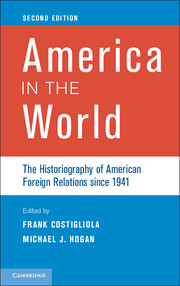Book contents
- Frontmatter
- Dedication
- Contents
- List of Contributors
- Preface
- 1 Introduction
- 2 The Charlie Maier Scare and the Historiography of American Foreign Relations, 1959–1980
- 3 Chaps Having Flaps: The Historiography of U.S. Foreign Relations, 1980–1995
- 4 Still Contested and Colonized Ground: Post–Cold War Interpretations of U.S. Foreign Relations during World War II
- 5 Recent Literature on Truman’s Atomic Bomb Decision
- 6 The Cold War
- 7 Cold War Presidents: Dwight D. Eisenhower, John F. Kennedy, Lyndon Baines Johnson, and Richard M. Nixon
- 8 The War that Never Ends: Historians and the Vietnam War
- 9 Culture and the Cold War: U.S.–Latin American Historiography since 1995
- 10 Impatient Crusaders: The Making of America’s Informal Empire in the Middle East
- 11 Explaining the Rise to Global Power
- 12 Bringing the Non-State Back In
- 13 Technology and the Environment in the Global Economy
- 14 U.S. Mass Consumerism in Transnational Perspective
- 15 A Worldly Tale
- Index
- References
15 - A Worldly Tale
Global Influences on the Historiography of U.S. Foreign Relations
Published online by Cambridge University Press: 05 June 2014
- Frontmatter
- Dedication
- Contents
- List of Contributors
- Preface
- 1 Introduction
- 2 The Charlie Maier Scare and the Historiography of American Foreign Relations, 1959–1980
- 3 Chaps Having Flaps: The Historiography of U.S. Foreign Relations, 1980–1995
- 4 Still Contested and Colonized Ground: Post–Cold War Interpretations of U.S. Foreign Relations during World War II
- 5 Recent Literature on Truman’s Atomic Bomb Decision
- 6 The Cold War
- 7 Cold War Presidents: Dwight D. Eisenhower, John F. Kennedy, Lyndon Baines Johnson, and Richard M. Nixon
- 8 The War that Never Ends: Historians and the Vietnam War
- 9 Culture and the Cold War: U.S.–Latin American Historiography since 1995
- 10 Impatient Crusaders: The Making of America’s Informal Empire in the Middle East
- 11 Explaining the Rise to Global Power
- 12 Bringing the Non-State Back In
- 13 Technology and the Environment in the Global Economy
- 14 U.S. Mass Consumerism in Transnational Perspective
- 15 A Worldly Tale
- Index
- References
Summary
Once upon a time, long, long ago, in a land called Cold War America, there was a history written of U.S. foreign relations. It was powerfully and, for the most part, unself-consciously shaped by national borders. It was often sophisticated in its research and analysis as well as complicated and diverse in its politics, ranging from orthodox defenses of U.S. policies abroad to revisionist critiques of what was often labeled the American empire. But most of its authors, on the left and right, wrote from a “world according to Washington” perspective, one rooted in the rich archival resources available on most aspects of U.S. policy making, but also driven primarily by questions about how Americans – particularly, powerful, elite makers of government policy – understood and behaved toward the rest of the world. Indeed, historians on the left and right shared a usually unrecognized common ground of emphasizing the role of the United States often to the detriment of other actors in the international arena. A few of the authors of this older history did take a broader view, internationalizing their footnotes with multilingual research as they began to write more comprehensive histories of the bilateral and multilateral relationships of the United States with other states. And some, influenced by the rise of social history in the 1970s and 1980s, pushed beyond questions of state policy and state behavior. Up through the 1980s, however, this historiography continued to be shaped, above all else and regardless of authors’ politics, by national borders and the governments contained therein.
- Type
- Chapter
- Information
- America in the WorldThe Historiography of American Foreign Relations since 1941, pp. 338 - 360Publisher: Cambridge University PressPrint publication year: 2013



